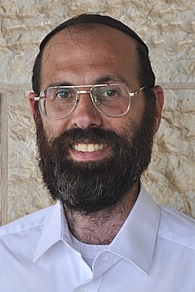Who is the Person who Wants Life
הרב מרדכי גרינברג
נשיא הישיבה
The Midrash comments on the pasuk, "This shall be the law of the metzora" (Vayikra 14:2):
This is what it says, "Who is the man who desires life." (Tehillim 34:14) There once was a peddler who traveled around the villages near Zipori, and would declare, "Who wants to buy the elixir of life!" ... R. Yanai was sitting ... He imposed upon [the peddler], and he went up to him. He took out a book of Tehillim, and showed him the pasuk, "Who is the man who desires life." What does it say afterwards? "Guard your tongue from evil, and your lips from speaking deceit." (34:15) ... R. Yanai said: My whole life I read this pasuk, and I did not realize how simple it is, until this peddler came and told me, "Who is the man who wants life." Therefore, Moshe warns Israel and says to them, "This shall be the law of the metzora" - the law of the motzi shem ra (slanderer).
This passage is baffling. What novel idea did this peddler reveal to R. Yanai that he did not know beforehand?
In the sefer Be'er Moshe, the Admor of Ozrov points to a similar Gemara in Masechet Avoda Zara (19b):
R. Alexandri declared: "Who wants life? Who wants life?" Everybody gathered and came to him. They said to him. "Give us life!" He said to them: "Who is the man who desires life ... Guard your tongue from evil." Perhaps a person will say, I guarded my tongue from evil, and my lips from speaking deceit, I will now go and indulge in sleep." The pasuk teaches, "Turn from evil and do good." (34:16) Good is none other than Torah, as it says, "For I have given you a good purchase, do not forsake my Torah."
From the pasuk, "Who is the person who desires life...," one could understand that turning away from evil is enough to grant life. This could be the conclusion of the Gemara, "Perhaps a person will say, I guarded my tongue from evil, and my lips from speaking deceit, I will now go and indulge in sleep." In other words, since he guards his mouth and tongue from speaking evil, this is the perfection of the attribute of speech. To this comes the continuation of the pasuk: "Turn from evil and do good," that it is not enough to guard the tongue from speaking evil, but rather it should be used for positive purposes, for good, and "Good is none other than Torah, as it says, 'For I have given you a good purchase, do not forsake my Torah.'"
"Life" does not mean simply the lack of death, but rather a life of positive value. Thus, for one who desires life, it is not enough to avoid evil, but there is need to do good.
This is what the peddler asked, "Who is the man who desires life" – inherent life. To this the answer is: "Guard your tongue from evil ... and do good!"
To this the Torah says, "See- I have placed before you the life and the good." (Devarim 30:15) Life is linked with good. Therefore, the answer to the question, "Who is the man who desires life?" – is: "Guard your tongue from evil ... and do good."
Parshas Tazria and Metzora are usually read during the sefira period, which are days of preparation to receive the Torah. As we say in the prayer after the sefira counting, they are days that are special "To purify us from our imperfections and contaminations," i.e., to free ourselves from all evil that sticks to us. However, this is not enough, and we ask, "I should be purified and sanctified with a holiness of Above."
The Torah portions are also arranged in this manner. Tazria and metzora deal with removing all evil and contamination, and afterwards come the portions Acharei Mot and Kedoshim, which deal with the sanctity of Shabbat and the festivals, which elevate man and sanctify him with the holiness.
Therefore, the sefira days are begun with the korban of the omer, which is from barley – animal food, and conclude with Shavuot, when we offer the two loaves from wheat, which is human food. This teaches that before spiritual ascent, a person first has to distance himself from animalistic actions, and only afterwards can he pursue human activities and sanctify himself with a Divine holiness. – "Be holy!"
קוד השיעור: 3738
לשליחת שאלה או הארה בנוגע לשיעור:

.jpg)



